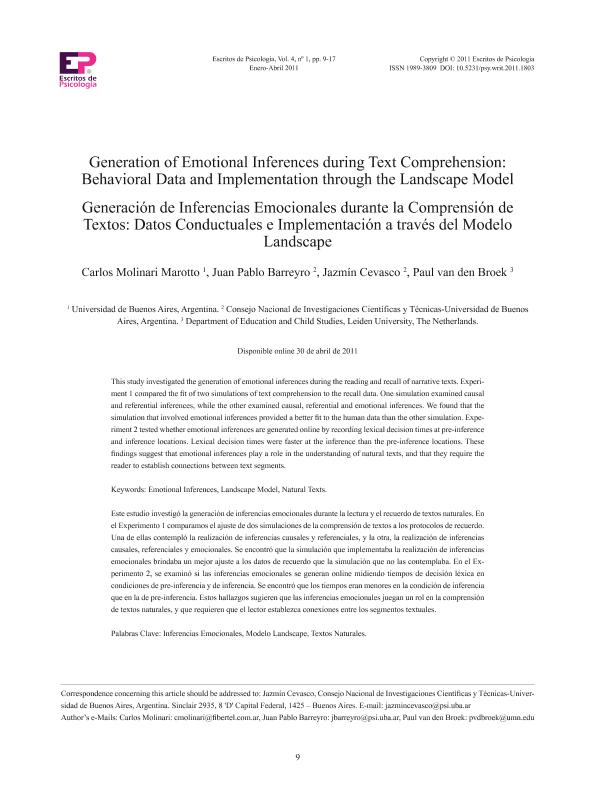Artículo
This study investigated the generation of emotional inferences during the reading and recall of narrative texts. Experiment 1 compared the fit of two simulations of text comprehension to the recall data. One simulation examined causal and referential inferences, while the other examined causal, referential and emotional inferences. We found that the simulation that involved emotional inferences provided a better fit to the human data than the other simulation. Experiment 2 tested whether emotional inferences are generated online by recording lexical decision times at pre-inference and inference locations. Lexical decision times were faster at the inference than the pre-inference locations. These findings suggest that emotional inferences play a role in the understanding of natural texts, and that they require the reader to establish connections between text segments.ment 1 compared the fit of two simulations of text comprehension to the recall data. One simulation examined causal and referential inferences, while the other examined causal, referential and emotional inferences. We found that the simulation that involved emotional inferences provided a better fit to the human data than the other simulation. Experiment 2 tested whether emotional inferences are generated online by recording lexical decision times at pre-inference and inference locations. Lexical decision times were faster at the inference than the pre-inference locations. These findings suggest that emotional inferences play a role in the understanding of natural texts, and that they require the reader to establish connections between text segments. Este estudio investigó la generación de inferencias emocionales durante la lectura y el recuerdo de textos naturales. En el Experimento 1 comparamos el ajuste de dos simulaciones de la comprensión de textos a los protocolos de recuerdo. Una de ellas contempló la realización de inferencias causales y referenciales, y la otra, la realización de inferencias causales, referenciales y emocionales. Se encontró que la simulación que implementaba la realización de inferencias emocionales brindaba un mejor ajuste a los datos de recuerdo que la simulación que no las contemplaba. En el Experimento 2, se examinó si las inferencias emocionales se generan online midiendo tiempos de decisión léxica en condiciones de pre-inferencia y de inferencia. Se encontró que los tiempos eran menores en la condición de inferencia que en la de pre-inferencia. Estos hallazgos sugieren que las inferencias emocionales juegan un rol en la comprensión de textos naturales, y que requieren que el lector establezca conexiones entre los segmentos textuales.
Generation of emotional inferences during the reading of narratives: using the Landscape model to simulate comprehension
Título:
Generación de Inferencias Emocionales durante la Comprensión de Textos: Datos Conductuales e Implementación a través del Modelo Landscape
Fecha de publicación:
04/2011
Editorial:
Universidad de Málaga
Revista:
Escritos de Psicología
ISSN:
1138-2635
Idioma:
Inglés
Tipo de recurso:
Artículo publicado
Clasificación temática:
Resumen
Archivos asociados
Licencia
Identificadores
Colecciones
Articulos(SEDE CENTRAL)
Articulos de SEDE CENTRAL
Articulos de SEDE CENTRAL
Citación
Molinari Marotto, Carlos; Barreyro, Juan Pablo; Yomha Cevasco, Jazmin; van den Broek, Paul; Generation of emotional inferences during the reading of narratives: using the Landscape model to simulate comprehension; Universidad de Málaga; Escritos de Psicología; 4; 1; 4-2011; 9-17
Compartir




